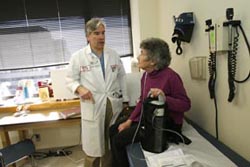|
The National Heart Lung and Blood Institute has named the Temple Lung Center a clinical site for the most comprehensive study of the genetic epidemiology of chronic obstructive pulmonary disease ever undertaken. The $37 million NHLBI grant, led by the National Jewish Medical and Research Center and Brigham and Women’s Hospital, aims to identify genes and other risk factors that influence the development of the disease.
COPD is the only leading cause of death in the United States that has been steadily increasing in frequency over the past decade. There is no treatment that can cure the disease and only a few measures to extend the lives of patients.
“The long-term goals of the study are to allow us to better understand the disease so that we can find more effective treatments,” said Gerard Criner, M.D., director of the Lung Center at Temple University Hospital and professor of medicine and director of pulmonary and critical care medicine at the School of Medicine.
|
Photo by Joseph V. Labolito/University Photography
Gerry Criner, director of the Temple Lung Center, examines a COPD patient.
|
|
Temple is one of 17 clinical sites nationwide, which will enroll a total of 10,500 smokers with and without COPD, 3,500 of whom will be African American, a population whose COPD rates are rapidly growing and whose risk factors have not been adequately studied.
"Despite its prevalence, we still know so little about the disease," said James Crapo, M.D., professor of medicine at National Jewish and co-principal investigator of the study. "This study will help us determine which smokers are most at risk of developing the disease, who is most likely to have progressive disease, and how to more effectively treat it."
Specifically, the researchers will seek to discover the genes responsible for this chronic lung disease and to develop a comprehensive data sharing plan so that this study will become a national resource for the scientific community. A mutation in the alpha-1 antitrypsin gene accounts for about one to two percent of COPD cases, but researchers hypothesize other genetic factors are likely involved.
COPD, which includes chronic bronchitis and emphysema, is most often caused by smoking, and leaves sufferers winded, weak and too fatigued to pursue their regular activities. As the fourth-largest killer in the United States, COPD resulted in 1.5 million emergency room visits, 726,000 hospitalizations and 119,000 deaths in 2000 alone. And due to higher smoking rates in women over the past several decades, the rate of women dying from COPD has increased more than 150 percent since 1980.
The NHLBI is promoting better awareness of COPD through its public education campaign, Learn More Breathe Better. For more information, visit www.learnaboutcopd.org.
Clinical centers participating in this study:
Baylor College of Medicine
Brigham and Women’s Hospital/Harvard School of Public Health
Columbia University Medical Center
Duke University Medical Center
Johns Hopkins University
LDS Hospital/University of Utah
Los Angeles Biomedical Research Institute at Harbor-UCLA Medical Center
Morehouse School of Medicine
National Jewish Medical and Research Center
Temple University
University of Alabama–Birmingham
University of California–San Diego
University of Iowa
University of Michigan
University of Minnesota, VA Medical Center
University of Pittsburgh Medical Center
University of Texas Health Sciences Center at San Antonio
A team from Johns Hopkins University, the Harvard School of Public Health, Brigham and Women's Hospital, and the University of Colorado will provide statistical analysis.
|
